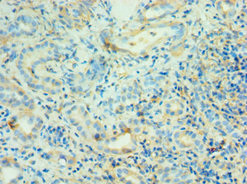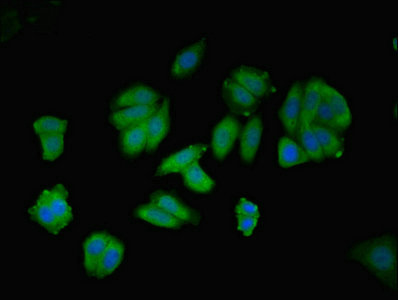Full Product Name
Rabbit anti-Homo sapiens (Human) AGT Polyclonal antibody
Alternative Names
Aangiotensinogen (serpin peptidase inhibitor clade A member 8) antibody; AGT antibody; AI265500 antibody; Alpha 1 antiproteinase antitrypsin antibody; Ang antibody; Ang I antibody; Ang II antibody; Ang III antibody; AngII antibody; Angiotensin I antibody; Angiotensin II antibody; Angiotensin III antibody; Angiotensin-3 antibody; Angiotensinogen (PAT) antibody; Angiotensinogen antibody; ANGT_HUMAN antibody; ANHU antibody; ANRT antibody; AT-2 antibody; AT-II antibody; Des-Asp[1]-angiotensin II antibody; FLJ92595 antibody; FLJ97926 antibody; MGC105326 antibody; PAT antibody; Pre angiotensinogen antibody; Serine (or cysteine) proteinase inhibitor antibody; Serpin A8 antibody; Serpin peptidase inhibitor clade A member 8 antibody; SERPINA8 antibody
Immunogen
Recombinant Human Angiotensinogen protein (35-285AA)
Immunogen Species
Homo sapiens (Human)
Purification Method
Antigen Affinity Purified
Concentration
It differs from different batches. Please contact us to confirm it.
Buffer
PBS with 0.02% sodium azide, 50% glycerol, pH7.3.
Tested Applications
ELISA, IHC, IF
Recommended Dilution
| Application |
Recommended Dilution |
| IHC |
1:20-1:200 |
| IF |
1:50-1:200 |
Storage
Upon receipt, store at -20°C or -80°C. Avoid repeated freeze.
Lead Time
Basically, we can dispatch the products out in 1-3 working days after receiving your orders. Delivery time maybe differs from different purchasing way or location, please kindly consult your local distributors for specific delivery time.
Usage
For Research Use Only. Not for use in diagnostic or therapeutic procedures.







